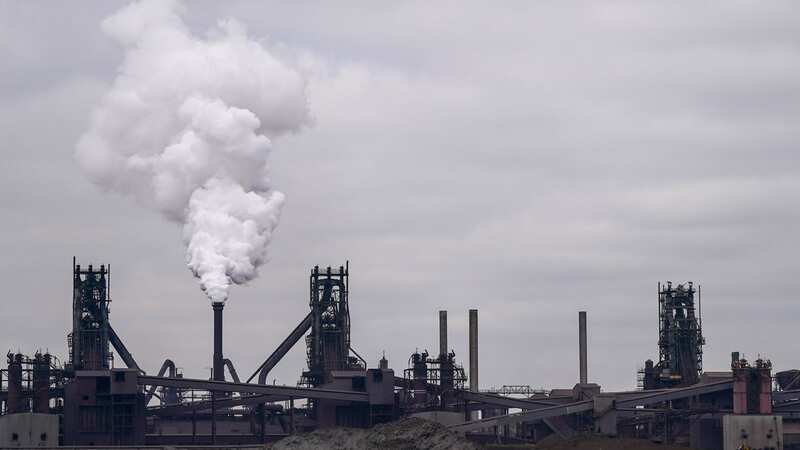2,000 British Steel jobs at risk as Chinese-owned firm plans to axe furnace

Unions today vowed to fight plans to axe 2,000 workers at British Steel.
The firm, owned by Chinese giant Jingye, confirmed it wants to close its coal-fired blast furnaces at Sconthrpe, Lincs, and switch to less-polluting electric arc systems. Coupled with Tata’s plans to close blast furnaces and cut about 3,000 jobs at Port Talbot, it would leave the UK unable to make “virgin steel” and relying on foreign imports.
British Steel hailed its “ambitious plans for the biggest transformation in its history – a £1.25billion proposal to become a clean, green and sustainable business”. It wants taxpayer cash to help build two electric arc furnaces - one in Scunthorpe and the other on Teesside. It has already been offered £300million by the Government.
“The new furnaces could be operational by late 2025 and would replace the ageing iron and steelmaking operations in Scunthorpe which are responsible for the vast majority of the company’s CO2 emissions,” it said. But EAF uses far less manpower, meaning jobs are under threat.
Union sources fear 2,000 staff could be made redundant. British Steel chief executive Xijun Cao said: “Decarbonisation is a major challenge for our business but we are committed to manufacturing the homemade, low-embedded, carbon steel the UK needs. We have engaged extensively with the public and private sector to understand the feasibility of producing net-zero steel with our current blast furnace operations.
 Teachers, civil servants and train drivers walk out in biggest strike in decade
Teachers, civil servants and train drivers walk out in biggest strike in decade
“However, thorough analysis shows this is not viable. Detailed studies show electrification could rapidly accelerate our journey to net-zero and drive British Steel towards a sustainable future. It would also ensure we can provide our customers with the steel they require.”
Community steelworkers’ union general secretary Roy Rickhuss said: “We are deeply concerned by British Steel’s plans for an EAF-only approach at Scunthorpe and Teesside, and it is vital a meaningful consultation takes place to assess all the options to secure the future of steelmaking. Were they to be realised, the plans that British Steel has announced, combined with Tata Steel’s plans, would leave the UK unable to make steel from raw materials and dangerously exposed to international markets. Community firmly believes that the blast furnaces continue to be vital in any responsible transition to green steelmaking.”
GMB national officer Charlotte Brumpton-Childs said: “Any scheme that would close the blast furnaces in Scunthorpe would be another hammer blow for UK steel. Potential job losses on this scale would be devastating for the people of Scunthorpe. Formal consultation has not begun - although the business has started to talk to GMB and other unions about the various options on the table. GMB remains committed to debcarbonising the industry in a way that protects virgin steelmaking in the UK and the jobs it supports.”
British Steel employs around 4,500 people across the UK.
Prime Minister Rishi Sunak’s spokesman insisted: “We are continuing to work closely with industry, including British Steel, to secure a sustainable and competitive future for the sector and its workers and we've offered generous support package including £300m of investment for British Steel to cut emissions, safeguard jobs and unlock over £1billion in stakeholder investment. Now, ultimately, it is for British Steel themselves to manage commercial decisions for their company's future and obviously I can't specifically comment on their discussions. But we will remain committed to supporting the sector.”
Gareth Stace, director-general of trade body UK Steel, said: “This is a turning point for UK steelmaking. During this transition, we must all work together in partnership with industry, Government and trade unions to ensure the future of our sector. As we switch to electric steelmaking and cut our emissions, planning regulation snags and high electricity prices must not hold back investment in new EAF capacity. It will not be a straightforward transition, but for the whole steel sector - from existing electric furnaces to companies making huge investments now - our goal is clear.”
Indian giant Tata shelved making a decision on 3,000 job cuts at Britain’s biggest steelworks, Port Talbot, last week.
But unions fear an announcement could come within days as the firm pushes ahead with plans to close blast furnaces and switch to less-polluting electric arc furnaces. The chaos came two months after the Tories announced £500million of taxpayers’ money will be pumped into the factory to help it switch to electric arc furnaces.
The firm will inject another £725m under the scheme, following months of negotiations with ministers and officials. Tata was expected to confirm on Wednesday that 3,000 posts would go by March. It was also due to bring to an end “virgin” steelmaking at Port Talbot in South Wales after 121 years, with the mothballing of “heavy end” operations - blast furnaces and coke ovens. The Mirror understands it will be at least four years before electric arc furnaces can begin production - and even then the steel produced will not be “virgin” metal but from melted down scrap. Until then, foreign “hot rolled” or “slab” steel manufactured abroad will be imported for use at Port Talbot, where it will be converted into products for use in other sectors.
The Mirror has been campaigning to Save Our Steel since 2015.
 Sunak branded 'pathetic' for attempt to pin blame on Labour for mass strikes
Sunak branded 'pathetic' for attempt to pin blame on Labour for mass strikes
Read more similar news:
Comments:
comments powered by Disqus

































